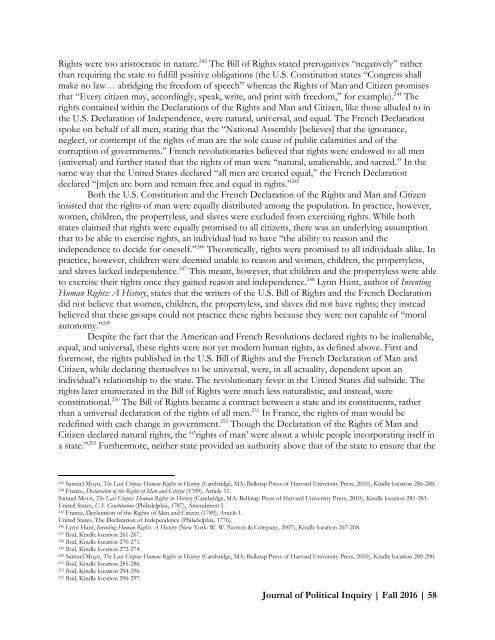Fall2016_Final
Create successful ePaper yourself
Turn your PDF publications into a flip-book with our unique Google optimized e-Paper software.
Rights were too aristocratic in nature. 243 The Bill of Rights stated prerogatives “negatively” rather<br />
than requiring the state to fulfill positive obligations (the U.S. Constitution states “Congress shall<br />
make no law… abridging the freedom of speech” whereas the Rights of Man and Citizen promises<br />
that “Every citizen may, accordingly, speak, write, and print with freedom,” for example). 244 The<br />
rights contained within the Declarations of the Rights and Man and Citizen, like those alluded to in<br />
the U.S. Declaration of Independence, were natural, universal, and equal. The French Declaration<br />
spoke on behalf of all men, stating that the “National Assembly [believes] that the ignorance,<br />
neglect, or contempt of the rights of man are the sole cause of public calamities and of the<br />
corruption of governments.” French revolutionaries believed that rights were endowed to all men<br />
(universal) and further stated that the rights of man were “natural, unalienable, and sacred.” In the<br />
same way that the United States declared “all men are created equal,” the French Declaration<br />
declared “[m]en are born and remain free and equal in rights.” 245<br />
Both the U.S. Constitution and the French Declaration of the Rights and Man and Citizen<br />
insisted that the rights of man were equally distributed among the population. In practice, however,<br />
women, children, the propertyless, and slaves were excluded from exercising rights. While both<br />
states claimed that rights were equally promised to all citizens, there was an underlying assumption<br />
that to be able to exercise rights, an individual had to have “the ability to reason and the<br />
independence to decide for oneself.” 246 Theoretically, rights were promised to all individuals alike. In<br />
practice, however, children were deemed unable to reason and women, children, the propertyless,<br />
and slaves lacked independence. 247 This meant, however, that children and the propertyless were able<br />
to exercise their rights once they gained reason and independence. 248 Lynn Hunt, author of Inventing<br />
Human Rights: A History, states that the writers of the U.S. Bill of Rights and the French Declaration<br />
did not believe that women, children, the propertyless, and slaves did not have rights; they instead<br />
believed that these groups could not practice these rights because they were not capable of “moral<br />
autonomy.” 249<br />
Despite the fact that the American and French Revolutions declared rights to be inalienable,<br />
equal, and universal, these rights were not yet modern human rights, as defined above. First and<br />
foremost, the rights published in the U.S. Bill of Rights and the French Declaration of Man and<br />
Citizen, while declaring themselves to be universal, were, in all actuality, dependent upon an<br />
individual’s relationship to the state. The revolutionary fever in the United States did subside. The<br />
rights later enumerated in the Bill of Rights were much less naturalistic, and instead, were<br />
constitutional. 250 The Bill of Rights became a contract between a state and its constituents, rather<br />
than a universal declaration of the rights of all men. 251 In France, the rights of man would be<br />
redefined with each change in government. 252 Though the Declaration of the Rights of Man and<br />
Citizen declared natural rights, the “’rights of man’ were about a whole people incorporating itself in<br />
a state.” 253 Furthermore, neither state provided an authority above that of the state to ensure that the<br />
243<br />
Samuel Moyn, The Last Utopia: Human Rights in History (Cambridge, MA: Belknap Press of Harvard University Press, 2010), Kindle location 286-288.<br />
244<br />
France, Declaration of the Rights of Man and Citizen (1789), Article 11.<br />
Samuel Moyn, The Last Utopia: Human Rights in History (Cambridge, MA: Belknap Press of Harvard University Press, 2010), Kindle location 281-283.<br />
United States, U.S. Constitution (Philadelphia, 1787), Amendment I.<br />
245<br />
France, Declaration of the Rights of Man and Citizen (1789), Article 1.<br />
United States, The Declaration of Independence (Philadelphia, 1776).<br />
246<br />
Lynn Hunt, Inventing Human Rights: A History (New York: W. W. Norton & Company, 2007), Kindle location 267-268.<br />
247<br />
Ibid, Kindle location 261-267.<br />
248<br />
Ibid, Kindle location 270-271.<br />
249<br />
Ibid, Kindle location 272-274.<br />
250<br />
Samuel Moyn, The Last Utopia: Human Rights in History (Cambridge, MA: Belknap Press of Harvard University Press, 2010), Kindle location 289-290.<br />
251<br />
Ibid, Kindle location 285-286.<br />
252<br />
Ibid, Kindle location 294-296.<br />
253<br />
Ibid, Kindle location 296-297.<br />
Journal of Political Inquiry | Fall 2016 | 58
















